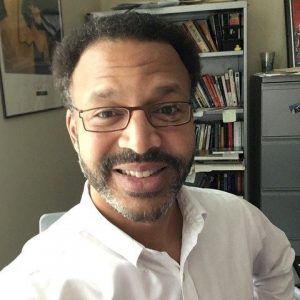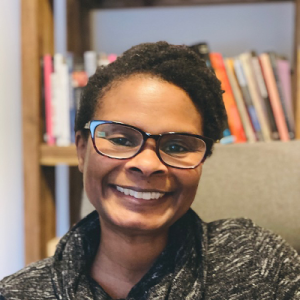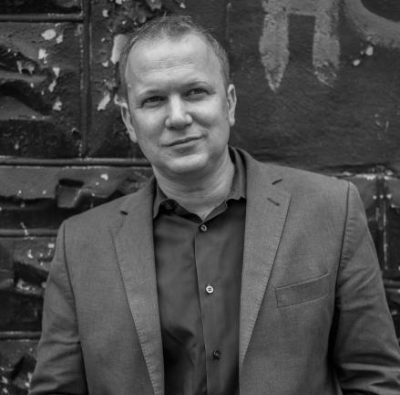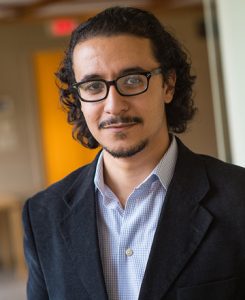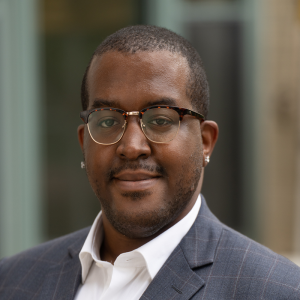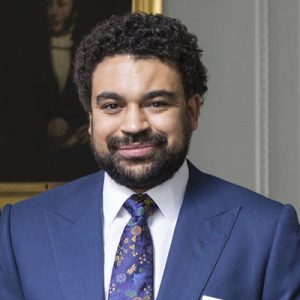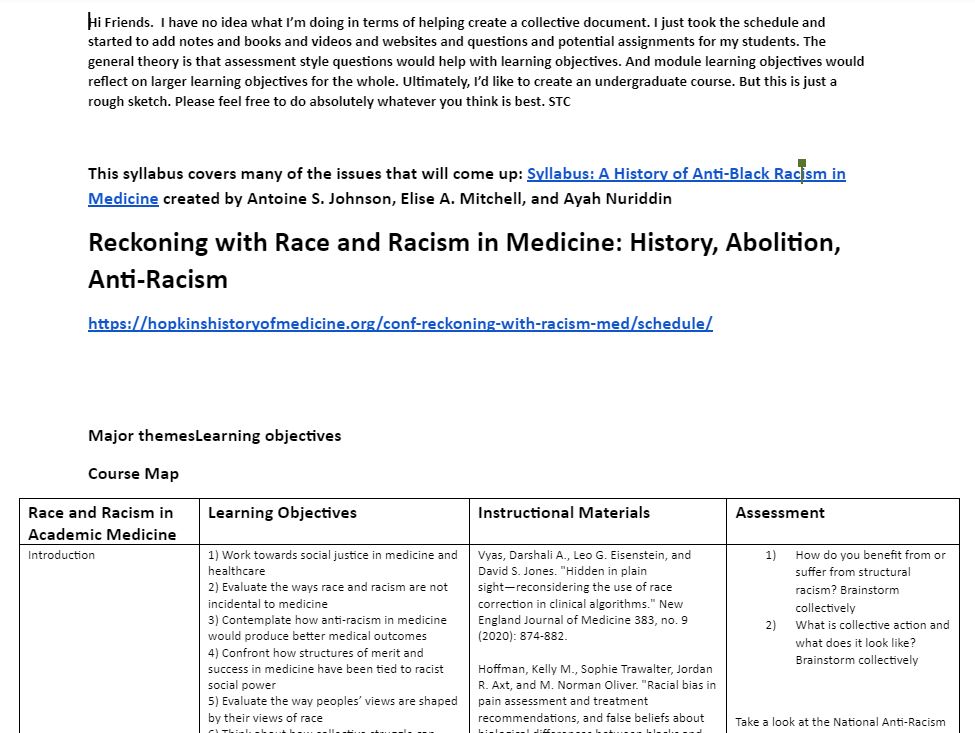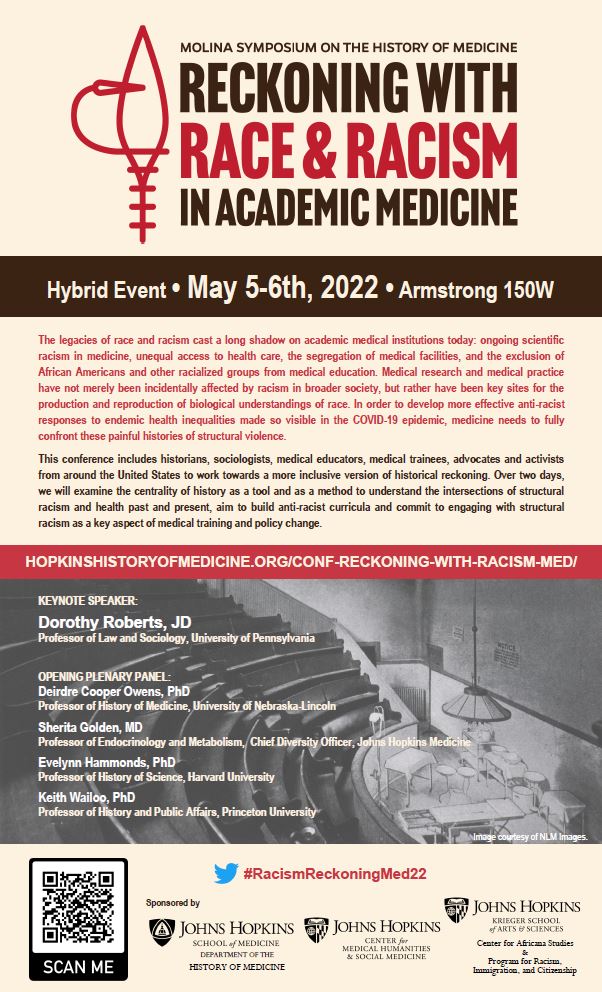Conference: Reckoning with Race and Racism in Academic Medicine
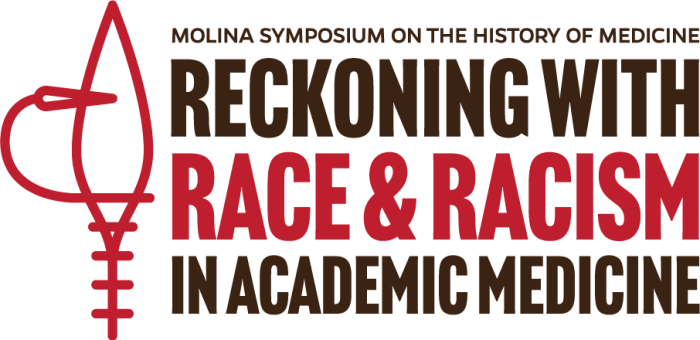
May 5th & 6th, 2022
#RacismReckoningMed22
The legacies of race and racism cast a long shadow on academic medical institutions today: ongoing scientific racism in medicine, unequal access to health care, the segregation of medical facilities, and the exclusion of African Americans and other racialized groups from medical education. Medical research and medical practice have not merely been incidentally affected by racism in broader society, but rather have been key sites for the production and reproduction of biological understandings of race. In order to develop more effective anti-racist responses to endemic health inequalities made so visible in the COVID-19 epidemic, medicine needs to fully confront these painful histories of structural violence. This conference includes historians, sociologists, medical educators, medical trainees, advocates and activists from around the United States to work towards a more inclusive version of historical reckoning. Over two days, we will examine the centrality of history as a tool and as a method to understand the intersections of structural racism and health past and present, aim to build anti-racist curricula and commit to engaging with structural racism as a key aspect of medical training and policy change.
This Molina Symposium in the History of Medicine is sponsored by the Johns Hopkins Department of the History of Medicine, Center for Africana Studies, Program for Racism, Immigration, and Citizenship, and the Center for Medical Humanities & Social Medicine.
Highlight:
Dr. Dorothy Roberts,
Keynote Speaker

Logistics
View conference videos by clicking here.
Choose “watch replay” and enter your email address to view videos of conference panels.
Once logged in, under the title of the event, you should see “SCHEDULE session 1 of 18 Day 1 Opening: 9:30am—12pm (more).” By clicking “more,” a dropdown menu will appear and you’ll be able to choose a session and view the video replay. Click here for a full schedule, so you’ll be able to find your intended panel.
For any technical difficulties or questions, email myrobbins@jhmi.edu.
Highlight:
Conference Planning Board
Special thanks to Adam Biggs, Kimberly Gallon, Jeremy Greene, Graham Mooney, Ayah Nuriddin, Ahmed Ragab, Ezelle Sanford, and Alexandre White for their dedicated efforts on our conference planning board.
Accessibility
We are unable to include automatic captioning services through our conference broadcasting service at this time. We would like to suggest two free options that will allow you to enable this feature on your own browser.
If you use Google Chrome, then you can enable Chrome’s Live Captioning feature. Click here for instructions.
If you prefer another browser, then Web Captioner is another free service that offers real-time captioning.
Crowdsourced Syllabus
One unplanned result of the collective brought together for this conference is a crowd sourced syllabus, linked below. Please feel encouraged to contribute as you continue participating in the sessions.
https://docs.google.com/document/d/1TtHTjE_cCIK696bQhgixuYr4SCId6Kk_cUb5q3zAQ6g/edit
Call for Papers
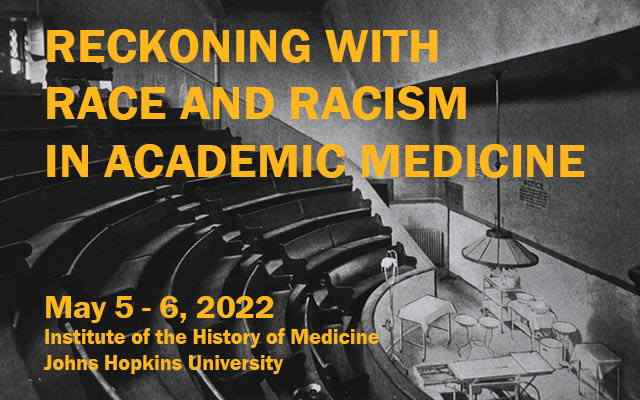
Call For Papers — Reckoning with Race and Racism in Academic Medicine
Department of the History of Medicine, Johns Hopkins School of Medicine
Center for Africana Studies, Johns Hopkins University
Program in Racism, Immigration, and Citizenship, Johns Hopkins University
May 5-6, 2022
We invite contributions to a conference on Reckoning with Race and Racism in Academic Medicine to confront the legacies of white supremacy and exclusion in American academic medicine and the central role that academic medicine has played and continues to play in the perpetuation of false biological concepts of race. As the Johns Hopkins Hospital and School of Medicine were founded as segregated institutions, we are particularly interested in engaging the broader history and ongoing legacies of segregation in academic medical centers and their surrounding communities. We welcome studies of racialized histories of medical research in the twentieth and the complexity of racial inclusion as well as exclusion and exploitation in academic medicine, and how this history shapes current questions of trust, distrust, mistrust, and trustworthiness in relation to academic medical centers. We also welcome meaningful examples of health and medical care as sites of antiracist advocacy.
Racism has not just been incidental to the production of medical knowledge and the formation of medical institutions, but has often been essential to their construction. The history of medicine and health care is marked by racial injustice and myriad forms of violence: ongoing scientific racism in medicine, unequal access to health care, the segregation of medical facilities, and the exclusion of African Americans and other racialized groups from medical education. These practices often form the backbone of racist thought and structures outside of medicine as well. While none of this is news to communities of color in the United States, many in the field of academic medicine are at the beginning of addressing these issues in practice. In order to develop more effective anti-racist responses to entrenched health inequalities, the COVID-19 pandemic, and future health crises, medicine needs to fully confront these painful histories of structural violence. How can we move towards a more inclusive version of historical reckoning? What tools can be deployed to unseat the convenient mythologies we have constructed to convince ourselves that the institutions of daily life have benign trajectories? How can we learn to confront our more challenging historical legacies to produce lasting impact, engagement, and policy change?
This reckoning requires engagements both inside and outside of academic medicine. As this conference examines the centrality of history as a tool and as a method to understand the historic and current intersection of structural racism and health, it also reinforces broad institutional efforts by medical students and faculty and professional associations around the country to build antiracist curricula and commit to engaging with structural racism as a key aspect of medical training and policy change. We engage with this history not merely to expose past harms, but to chart a more equitable course forward for health and health care. We intend this conference to be an opportunity to think broadly and critically about history and its role in perpetuating structural racism in health and health care—and to explore how insights drawn from this history can be employed in dismantling ongoing racial inequalities.
We invite submissions of individual papers, panels, roundtables, and posters from across disciplines and communities. We especially encourage graduate and medical students, trainees, community organizations, professional associations, and activists to participate.
Topics may include, but are not limited to the following:
- The historical impact of segregation in medical practice and medical institutions and their surrounding communities
- The historical processes of segregation, desegregation and integration of medical institutions and the limits of diversity/inclusion policies in medical research and practice to date
- The role of academic medicine in propagating and reproducing scientific racism and popular beliefs in race as a biological category
- The role of history in current efforts to confront structural racism in health and healthcare today, from curricular reform in medical education to policy changes across professional bodies
DEADLINE FOR SUBMISSION: JANUARY 31 – EXTENDED TO FEBRUARY 7TH
SUBMIT HERE: https://forms.gle/XKYXDVym1Sp5N4VA7
Please contact Administrative Program Coordinator Marian Robbins at myrobbins@jhmi.edu with any questions or concerns.
